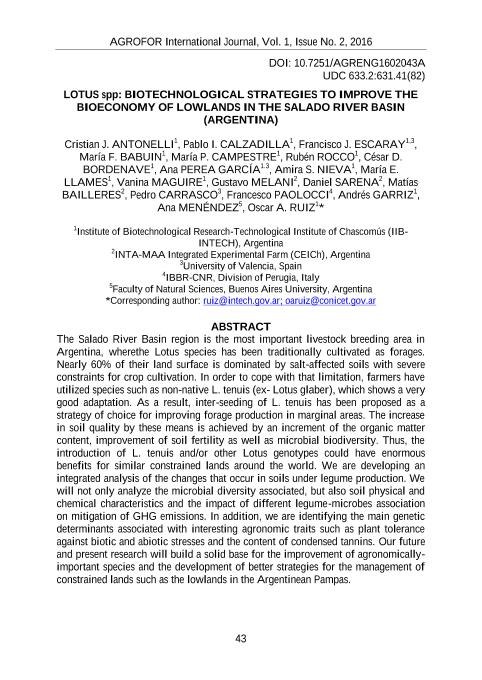Artículo
Lotus spp: biotechnological strategies to improve the bioeconomy of lowlands in the Salado River Basin (Argentina)
Antonelli, Cristian Javier ; Calzadilla, Pablo Ignacio
; Calzadilla, Pablo Ignacio ; Escaray, Francisco José
; Escaray, Francisco José ; Babuin, María Florencia
; Babuin, María Florencia ; Campestre, Maria Paula
; Campestre, Maria Paula ; Rocco, Ruben Anibal
; Rocco, Ruben Anibal ; Bordenave, César Daniel
; Bordenave, César Daniel ; Perea García, Ana; Nieva, Amira Susana del Valle
; Perea García, Ana; Nieva, Amira Susana del Valle ; Llames, Maria Eugenia del Rosario
; Llames, Maria Eugenia del Rosario ; Maguire, Vanina Giselle
; Maguire, Vanina Giselle ; Melani, Gustavo; Sarena, Daniel; Bailleres, Matías Andres; Carrasco Sorli, Pedro; Paolocci, Francesco; Gárriz, Andrés
; Melani, Gustavo; Sarena, Daniel; Bailleres, Matías Andres; Carrasco Sorli, Pedro; Paolocci, Francesco; Gárriz, Andrés ; Menendez, Ana Bernardina
; Menendez, Ana Bernardina ; Ruiz, Oscar Adolfo
; Ruiz, Oscar Adolfo
 ; Calzadilla, Pablo Ignacio
; Calzadilla, Pablo Ignacio ; Escaray, Francisco José
; Escaray, Francisco José ; Babuin, María Florencia
; Babuin, María Florencia ; Campestre, Maria Paula
; Campestre, Maria Paula ; Rocco, Ruben Anibal
; Rocco, Ruben Anibal ; Bordenave, César Daniel
; Bordenave, César Daniel ; Perea García, Ana; Nieva, Amira Susana del Valle
; Perea García, Ana; Nieva, Amira Susana del Valle ; Llames, Maria Eugenia del Rosario
; Llames, Maria Eugenia del Rosario ; Maguire, Vanina Giselle
; Maguire, Vanina Giselle ; Melani, Gustavo; Sarena, Daniel; Bailleres, Matías Andres; Carrasco Sorli, Pedro; Paolocci, Francesco; Gárriz, Andrés
; Melani, Gustavo; Sarena, Daniel; Bailleres, Matías Andres; Carrasco Sorli, Pedro; Paolocci, Francesco; Gárriz, Andrés ; Menendez, Ana Bernardina
; Menendez, Ana Bernardina ; Ruiz, Oscar Adolfo
; Ruiz, Oscar Adolfo
Fecha de publicación:
11/2016
Editorial:
University of East Sarajevo. Faculty of Agriculture
Revista:
AgroFor International
ISSN:
2490 3434
e-ISSN:
2490-3442
Idioma:
Inglés
Tipo de recurso:
Artículo publicado
Clasificación temática:
Resumen
The Salado River Basin region is the most important livestock breeding area in Argentina, wherethe Lotus species has been traditionally cultivated as forages. Nearly 60% of their land surface is dominated by salt-affected soils with severe constraints for crop cultivation. In order to cope with that limitation, farmers have utilized species such as non-native L. tenuis (ex- Lotus glaber), which shows a very good adaptation. As a result, inter-seeding of L. tenuis has been proposed as a strategy of choice for improving forage production in marginal areas. The increase in soil quality by these means is achieved by an increment of the organic matter content, improvement of soil fertility as well as microbial biodiversity. Thus, the introduction of L. tenuis and/or other Lotus genotypes could have enormous benefits for similar constrained lands around the world. We are developing an integrated analysis of the changes that occur in soils under legume production. We will not only analyze the microbial diversity associated, but also soil physical and chemical characteristics and the impact of different legume-microbes association on mitigation of GHG emissions. In addition, we are identifying the main genetic determinants associated with interesting agronomic traits such as plant tolerance against biotic and abiotic stresses and the content of condensed tannins. Our future and present research will build a solid base for the improvement of agronomically-important species and the development of better strategies for the management of constrained lands such as the lowlands in the Argentinean Pampas.
Archivos asociados
Licencia
Identificadores
Colecciones
Articulos(CCT - LA PLATA)
Articulos de CTRO.CIENTIFICO TECNOL.CONICET - LA PLATA
Articulos de CTRO.CIENTIFICO TECNOL.CONICET - LA PLATA
Articulos(IIB-INTECH)
Articulos de INST.DE INVEST.BIOTECNOLOGICAS - INSTITUTO TECNOLOGICO CHASCOMUS
Articulos de INST.DE INVEST.BIOTECNOLOGICAS - INSTITUTO TECNOLOGICO CHASCOMUS
Articulos(SEDE CENTRAL)
Articulos de SEDE CENTRAL
Articulos de SEDE CENTRAL
Citación
Antonelli, Cristian Javier; Calzadilla, Pablo Ignacio; Escaray, Francisco José; Babuin, María Florencia; Campestre, Maria Paula; et al.; Lotus spp: biotechnological strategies to improve the bioeconomy of lowlands in the Salado River Basin (Argentina); University of East Sarajevo. Faculty of Agriculture; AgroFor International; 1; 2; 11-2016; 43-53
Compartir
Altmétricas



